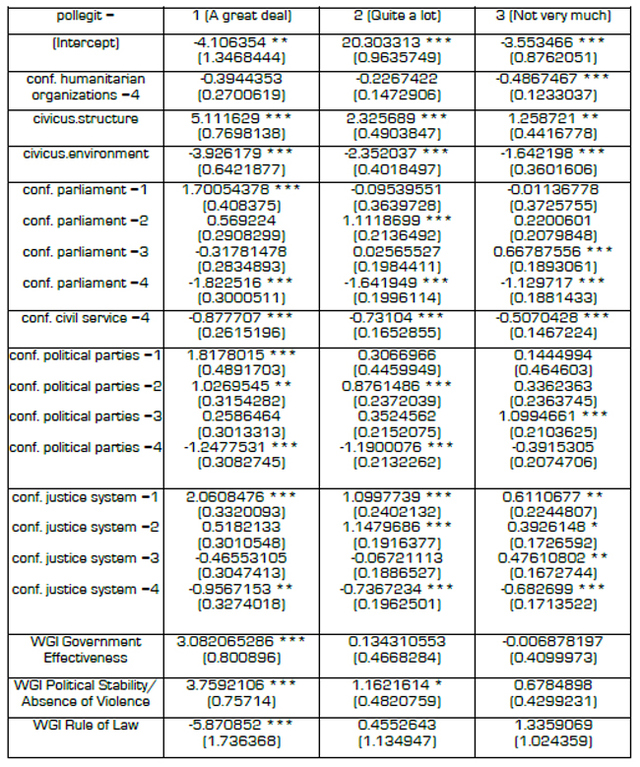From Center for Development and Strategy VOL. 2014 NO. 1Do Civil Society Organizations Undermine State-Building?
By
Center for Development and Strategy 2014, Vol. 2014 No. 1 | pg. 1/1
IN THIS ARTICLE
AbstractIn spite of the long-standing debate among economists on the optimal level of government involvement in economic development, little has been said on an optimal level of involvement by non-governmental "Civil Society" Organizations (CSOs). In particular, little has been said to address the potential trade-off between the influence of Civil Society Organizations (CSOs) and the influence of government. Using datasets such as the World Values Survey and the World Bank's World Governance Indicators, a multinomial logistic model is presented to model "political legitimacy" (a proxy for governmental influence) in 20 countries against 42 other variables. The results indicate that there is no such trade-off, and that political factors such as confidence in parliament, political parties, and the justice system are more significant in explaining political legitimacy than service provision by CSOs.2 IntroductionIn the wake of the devastating 2010 earthquake in Port-au-Prince, Haiti, nongovernmental organizations (NGOs) and other non-state humanitarian actors mobilized in response to the crisis. Yet while many of their relief efforts were hailed as successes, these actors have since been criticized for diverting 99% of the total international relief funding away from the Haitian government (Ramachandran & Waltz, 2012; Lessard, 2010). In particular, these criticisms have expressed concerns over the long-term implications of funding humanitarian organizations rather than the state on building the capabilities and political legitimacy of the Haitian government. The criticisms of humanitarian responses in Haiti point to a broader question: in general, do humanitarian "civil society" organizations (CSOs) promote or undermine the capabilities and legitimacy of the state and civil society? This is a question with profound policy implications for developing countries. In a post-Washington Consensus framework of economic development, it is widely accepted that due to pervasive market failures in developing economies, some degree of state intervention is needed in addition to market forces in order to sustain the path of development (Todaro & Smith, 2011). If CSOs truly undermine the role of the state, then the prospect of them creating an ineffective "phantom state" is more alarming. International CSOs rely on the funding of international donors; so two main arguments could be made to show that their interventions have detrimental effects on civil society. First, if international humanitarian organizations have primary upward accountability to international donors rather than the beneficiaries of their services, then their programs will primarily reflect the interests of the donors rather than empowering the interests of the local civil society. Secondly, humanitarian intervention can divert necessary resources and personnel away from governments that hold natural monopolies in the provision of certain public goods. In situations of imperfect and asymmetric information, the problem of adverse selection arises as the deadweight loss resulting from over-competition could be attributed to political ineptitude.As compelling as these arguments against humanitarian intervention may be, it certainly is not difficult to make justifiable opposing arguments. It may not necessarily be that humanitarian responses erode political legitimacy, but rather that low levels of political legitimacy prompts humanitarian responses. For instance, the second argument above relies on the assumption that CSOs and governments are competitors offering goods that are essentially substitutes. This assumption creates a "zero-sum game" mentality in which any humanitarian provision of public goods negatively affects the government's ability to provide them. Yet in countries where the government has limited information or capabilities to provide local public goods to the poor, CSOs might not be competing in the same sectors as the government, thereby making their interventions complements (rather than substitutes) for economic development. In theory, these interventions could reduce the total deadweight loss and even promote the role of grassroots civil society through advocacy campaigns. Further, if CSOs are actually more accountable to their beneficiaries than their donors, then the results of the first argument will be invalidated. In light of the previous discussion, it appears that deductive reasoning alone cannot establish the direction of causality between humanitarian intervention and political legitimacy. Therefore, empirical methods must be used to answer the following three questions:
The remainder of this paper is oriented towards answering the first question, with the understanding that the second and third pose a compelling area for future research. TerminologyIn order to qualify the results of the analysis in this paper, several terms must be made clear. First, the term "non-governmental organization" (NGO) is not particularly descriptive for the diversity of purposes, methods, organizational structures, and other variations that characterize civil society groups. In this paper, I will use the term "Civil Society Organization (CSO)" to refer to a very specific subset of all organizations formed without a profit or legislative motive; namely those engaged in charitable or humanitarian operations, whether locally or internationally. Such operations may include, among other things, the direct provision of goods and services, humanitarian aid, and capacity-building assistance for local sectors of the economy. The choice of the term "civil society'' reflects its definition in the Oxford English Dictionary as, "that aspect of society concerned with and operating for the collective good, independent of state control or commercial activity; all social groups, networks, etc., above the level of the family, which engage in voluntary collective action" (Oxford English Dictionary, 2010). Finally, the contested concept of "political legitimacy" (which is central to the analysis in this paper) is formalized according to sociologist Max Weber's definition of the term as, "the acceptance of [a political] authority and of the need to obey its commands" (Stanford Encyclopedia of Philosophy, 2010). Having defined these terms, the empirical section of this paper will proceed by modeling political legitimacy as a function of various governmental and CSO factors. ModelIn order to test the relationship between the influence of CSOs and the observed perceptions of political legitimacy, it is necessary to control for all other conceivable determinants of political legitimacy. In general, the econometric model at the focal point of this paper includes 42 variables and is specified by the equation: Let us now examine each part of this equation in detail. Demographic factorsThe first cluster of independent variables consists of demographic factors such as age, gender, income levels, etc. These variables are taken from the fourth wave of the World Values Survey (2005-2008); a panel data set commonly used in political science literature as a means of quantifying the subjective valuations that respondents place on key political and social institutions. Additionally, the categorical variable e069.11 ("Confidence: The Government") from these surveys is used as a proxy variable for political legitimacy, the dependent variable in the model. Civil Society factorsThe second set of variables relates to this paper's area of interest, namely the influence of civil society on perceived political legitimacy. Yet due to the notorious difficulty of measuring the reach of civil society, phase 1 of the Civicus Civil Society Index (2003-2006) has been decomposed as a set of proxy variables for CSO size and influence. Specifically, civicus.∗ refers to four variables relating to the four "dimensions" of the index: Structure (the degree of citizen participation in civil society), Environment (socio-political climate and state-civil society relations), Values (democracy, transparency, etc.), and Impact (effectiveness of CSOs to meet civil societal needs). Unfortunately, the short term of this index restricts the range of observations to those between the years 2003 and 2006, reducing the number of usable observations in the original World Values Survey by roughly 90%. Hopefully, the remaining 25,434 observations across 20 countries should be sufficient to prevent a strong bias in the results; however this issue will need to be remedied by a better proxy of civil society in the future. Political factorsThe final set of variables in the model relate to other political determinants of political legitimacy. For this section, crude measures of government service provision as well as a range of other "confidence" factors (the e069.∗ variables) from the World Values Survey are included. As the state of political society influences people's perceptions of political legitimacy, the World Bank's World Governance Indicators (WGI) data set has been included as the group of variables wgi.∗ to provide relatively unbiased measurements of governmental quality through six indices: Voice and Accountability, Political Stability and Absence of Violence, Government Effectiveness, Regulatory Quality, Rule of Law, and Control of Corruption. Additionally, Transparency International's Corruption Perceptions Index (CPI) (2003-2006) has been included as the variable cpi in order to better capture the effect of corruption on political legitimacy. ResultsDue to the categorical nature of the dependent variable (and others in the World Values Survey), the model presented here has been estimated through a multinomial logit regression rather than the typical OLS.3 Using the statistical package R to run the regression, the results for the most significant variables are presented in the table below. Variables marked with one asterisk (*) have p-values less than 0.05; those with two (**) and three (***) have p-values less than 0.01 and 0.001, respectively. Each column of the table above shows the estimates and standard errors for the log odds of the independent variables relative to a base value of e069.11 = 4 (None at all). That is, the 3.926179 estimate for civicus.environment when e069.11 = 1 should be interpreted as where ln(•) refers to the natural logarithm, P(•) refers to the probability operator, and !! refers to the remaining covariates and their estimates. Due to the large number of categories for the variables ethnicity and town size (i.e. ethnic-azerbaij, ethnic-javanese, ethnic-sudanese...), their contributions to the model have been summarized through joint significance tests.4 InterpretationFrom a first glance at the results of the regression, the negative coefficients for "confidence in humanitarian organizations" (one of the proxies for the strength of civil society) would appear to imply that there is a worldwide trade-off between the influence of CSOs and perceptions of political legitimacy. However, this conclusion is difficult to defend in light of the significance tests and the results for the other proxies civicus.structure and civicus.environment. Therefore, it is for the following reasons that this author argues against a worldwide trade-off:
While these observations cast doubt on a worldwide trade-off, this conclusion need not hold at a regional level. Further analysis is required to answer the second and third questions in the introduction, but the results do provide some preliminary hints for the second question. While confidence in parliament, political parties, and the justice system are not surprising as significant variables, ethnicity and town size are rather unexpected. Here are some potential explanations for these variables: Ethnicity Though this variable technically refers to the ethnicity of the respondent in the survey, it seems plausible that respondents of a certain ethnicity would vary their confidence in the government based on their access to and treatment by the government. In other words, it seems plausible that ethnic minorities exposed to poor treatment by the government would have low confidence in the government. Such a situation points to a government failure that CSOs might have the potential to alleviate. As mentioned by the former national director of a large CSO in Senegal, some CSOs will deliberately choose foreigners as program directors in order to prevent accusations of racial or tribal favoritism (Torrey Olson, personal communication, August 8, 2013). Town size Similarly to the explanation for ethnicity, the degree of attention focused on larger towns rather than smaller towns could create varying perceptions of confidence in the government. This result represents another government failure, but one in which the government is unable rather than unwilling to provide services to all citizens. As noted in the introduction, CSOs might be able to resolve this failure if they provide complementary services, but this hypothesis will need to be tested in the future. ConclusionWhile the criticisms of humanitarian responses in Haiti may have some merit, preliminary results show no strong evidence of a worldwide trade-off between the influence of CSOs and the levels of confidence in government. Though a better proxy for civil society will need to be developed in order to test the full range of the data, this makes the current results no less intriguing. Footnotes
ReferencesCenter for Global Development. (2012). Haiti: Where Has All the Money Gone? Washington, DC: Ramachandran, V. and Waltz, J. "Civil Society, N." OED Online. Oxford English Dictionary, n.d. Web. <http://www.oed.com/view/Entry/273776?redirectedFrom=%22Civil+society%22#eid>. Kaufmann, Daniel, Aart Kraay, and Massimo Mastruzzi. "Worldwide Governance Indicators." N.p., n.d. Web. <http://info.worldbank.org/governance/wgi/index.aspx#home>. Lessard, D. (2010). International NGOs and Statebuilding: the Case of Haiti, the Phantom State (Master's thesis). Lund University, Sweden. Peter, F. (2010, June 1). Political Legitimacy. Retrieved March 27, 2013, from http://plato.stanford.edu/entries/legitimacy/#toc Todaro, M. and Smith, S. (2011). Economic Development, 11th ed. London: Addison-Wesley. Transparency International. (2006). Corruption Perceptions Index. Retrieved from <http://www.transparency.org/research/cpi/overview> Wooldridge, J. (2009). Introductory Econometrics: A Modern Approach. 4th ed. Andover: Cengage "World Values Survey." WVS Database. World Values Survey Association, n.d. Web. <http://www.worldvaluessurvey.org/wvs.jsp>. Suggested Reading from Inquiries Journal
Inquiries Journal provides undergraduate and graduate students around the world a platform for the wide dissemination of academic work over a range of core disciplines. Representing the work of students from hundreds of institutions around the globe, Inquiries Journal's large database of academic articles is completely free. Learn more | Blog | Submit Latest in Political Science |




















